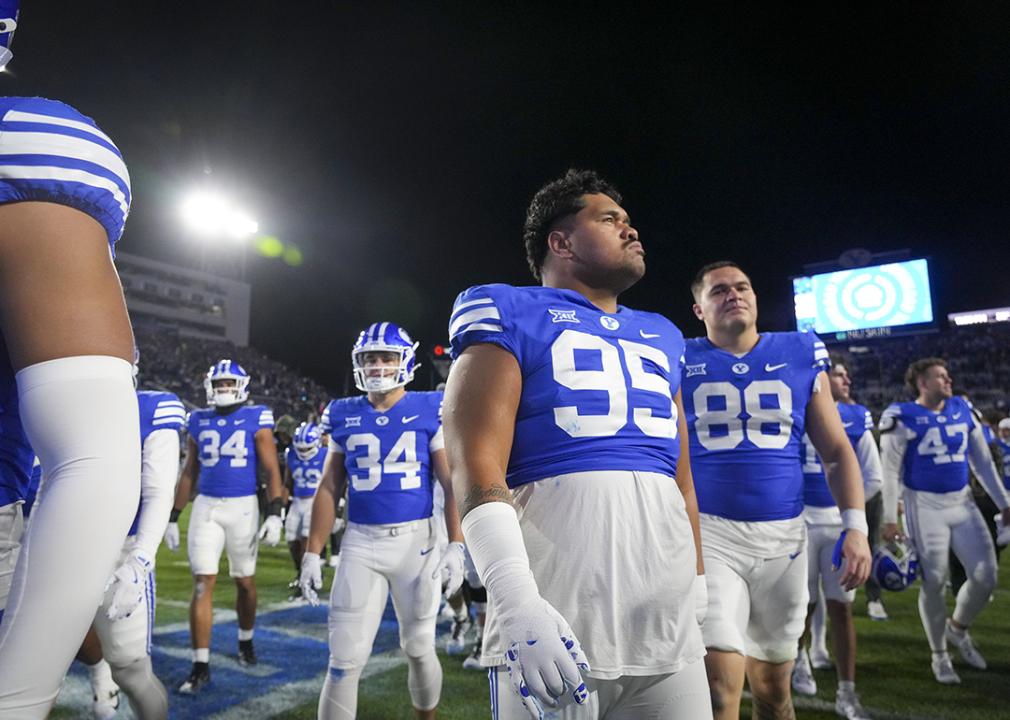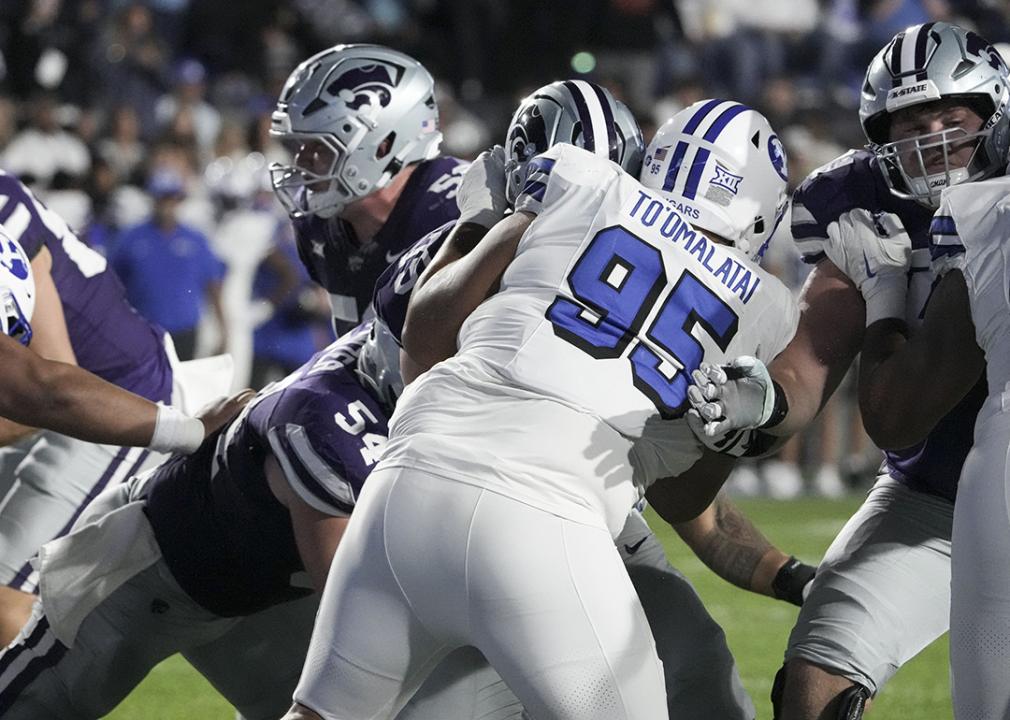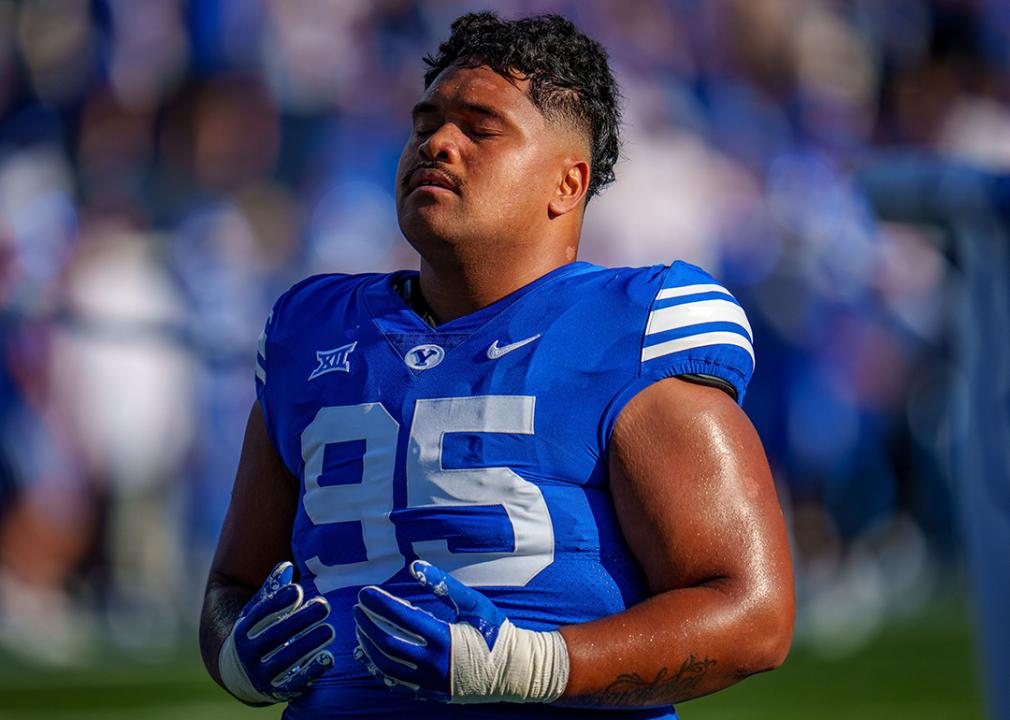He was selling plasma and sleeping in his van. Now, this BYU lineman is playing in the Alamo Bowl.

Bethany Baker // The Salt Lake Tribune
He was selling plasma and sleeping in his van. Now, this BYU lineman is playing in the Alamo Bowl.
Provo • Sione Po’uha knew something wasn’t right.
After a meeting in a hotel ballroom, bleary-eyed from BYU’s cross-country trek to West Virginia, the BYU defensive line coach was working the phones. Cougar head coach Kalani Sitake had instructed Po’uha and the rest of the coaching staff to FaceTime their recruits. Keep them on board, even as the Cougars limped to a 5-7 record.
So as the clock ticked closer to midnight in Morgantown, Po’uha dialed up Luke To’omalatai, a recruit from Long Beach City College in California.
“Hey, what are you up to?” Po’uha asked.
“Just hanging out in my car,” To’omalatai replied.
The answer troubled Po’uha, The Salt Lake Tribune reports. He’d had concerns about To’omalatai. When the coach visited Long Beach earlier in the year, the lineman wasn’t in the facility. Coaches covered for him, saying he must’ve been in class. But Po’uha scribbled in his notes that “he probably wasn’t.”
Yet looking at To’omalatai in his van that night, Po’uha didn’t pry. In the back of his mind, he knew the answer might get To’omalatai kicked off BYU’s recruiting list.
And Po’uha sensed he needed BYU.
“I love the mission of BYU. It just corresponds with what I’m trying to be in life,” he said. “Be very confident in yourself and your own vulnerabilities and downfalls. Share them with others. Welcome them.”
Months later, he found out.
To’omalatai wasn’t just hanging out of his car. He was living out of it for a time. He was hopping from job to job, and selling his plasma to get by. He’d been in and out of football, depressed and battling “personal issues.”
On the field, he was a Junior College All-American. Off of it, he was a mess.
But even in his darkest moments, To’omalatai kept taking Pohua’s calls—hoping for a lifeline out.
“It permeated in the way we interacted,” the coach said. “If someone’s having a lot of problems, but they still respond to you in a very cordial way, then their future is important to them. Not the circumstance.”
So that night, Po’uha hung up the phone and kept his concerns to himself.
He went to bed.
He kept To’omalatai on his list.
![]()

Bethany Baker // The Salt Lake Tribune
Losing His Way
As To’omalatai drove across Long Beach, fighting the California traffic, he thought, “How did it come to this?”
He was making his weekly trip to the plasma center. He’d get $100 in return for his donation—a way to supplement his income.
“I had to eat,” he said. “I was completely out of it. I don’t want to be here.”
To’omalatai wasn’t always that way. As his mother, Wanda, tells it, out of her three boys, it was To’omalatai who was supposed to be the Power Four star.
Growing up in the unrelenting Las Vegas summers, he would be the only one outside plying his craft as others clung to air conditioning. To’omalatai became a basketball and football standout. His hulking figure lent itself nicely to rugby in his spare time.
By his senior year of high school, Notre Dame poked around to ask about his future, Wanda said. Yet no big-time offer ever followed.
Idaho State was his best option. But when he went up to Pocatello for a visit, he took one look around and decided it wasn’t for him.
“It wasn’t the city I wanted to be in,” he told his parents. “It was snowing out there. It’s just different. There’s not a lot going on. [I decided to] take a gap year.”
It seemed like a fine choice. “He wasn’t mentally ready,” Wanda said.
But nobody accounted for the COVID-19 pandemic.
By 2020, his only offer on the table was a job at Tropical Smoothie. He did that for a bit, until his mental health began to decline.
“I ended up just playing video games and staying with my parents,” he said. “I gained a lot of weight. You call it depression.”
Visits with his college-bound friends only made it worse.
“They just look at you differently,” he said. “I went from recruited, team captain, all this stuff, to just like working a job that I didn’t want to work.”
He kicked the tires on football again. Mount San Antonio in California called, and he agreed to come out to fall camp. His grandparents lived in Long Beach and he could stay with them. But after three weeks, he backed out.
“Really don’t want to be out here,” he kept thinking.
He started to spiral.
He was an Amazon truck driver for a bit, working either the morning or late-night shift. When that was done, he tried his hand as a bouncer at a downtown Long Beach bar.
At the same time, his home life started to get off track. His grandparents were active members of the Seventh-day Adventist Church—a Protestant Christian denomination. They instituted a strict curfew, and if he was not home by 1 a.m., he was sleeping elsewhere.
Most nights, that was his car.
“That happened a lot,” Wanda said. “There were times where he called, and or my parents would call, like, ‘Luke is not home. He’s not answering our calls.'”
To’omalatai tried his luck at football a final time. He inquired about playing at Riverside with future BYU quarterback Jake Retzlaff—but they didn’t have room for him.
Eventually, he landed at Long Beach City College.
“My husband and I went out there, sat him down with my parents, and laid out the expectations, like, why he was truly there,” Wanda said.
Wanda thought it was a miscommunication.
“We explained to him, all you have to do is sleep here, wake up, go do your thing. But Luke, curfew was a thing,” she said. “I think for him, he saw it as, ‘They don’t want me here.’ But in reality, it was the rules that he just could not grasp.”
He thought he just had to make it one more year. Get an offer and get out. But he failed academically and once again, his plans were put in jeopardy.
“I had doubts within myself,” he said of whether he’d play Power Four football.
Then, he got his first interest from Po’uha and the Cougars.
At night, during some of his darkest moments, he started watching interviews of BYU coach Kalani Sitake on YouTube.
That was the man, he thought, he wanted to play for.
That man could turn his life around.

Trent Nelson // The Salt Lake Tribune
Turning the Tide
Midway through BYU’s first Big 12 campaign, Po’uha and the coaching staff knew they needed reinforcements on the defensive line.
Offenses were shredding the Cougars on the ground, knifing through the first layer of defense and rolling up 30 points a game. Defensive coordinator Jay Hill wanted his staff to find more depth up front. That led Po’uha right to Long Beach.
In To’omalatai, he saw the aggressiveness BYU needed. He had 42 tackles in his first year, eight for a loss. So he offered To’omalatai that summer—even though there were red flags.
Defensive coordinator Jay Hill and Sitake didn’t ask questions. They trusted the position coach’s evaluation.
“I offered him without them knowing,” Po’uha said.
And to To’omalatai, that was enough to guide him in the right direction. His grades picked up. He worked out his relationship with his grandparents. On the field, he ended the junior college season as a First-Team All-American.
Three weeks after Po’uha called from Morgantown, To’omalatai signed with BYU. For the first time in years, he felt his life was back on track.
“Kalani’s vision is what he wanted to be a part of, his leadership,” Wanda said. “He felt like he was going to help him grow as a person, as a man.”
A Family Affair
Every Friday before games, To’omalatai gets a visit from his family. His aunt lives in West Jordan and his parents come in from Las Vegas.
He will dip out from the team hotel and eat a family meal.
“I needed him to know that we were on the sidelines, his cheerleader,” Wanda said. “That everything he did, got him here.”
He is still a work in progress, Wanda admits. He gets homesick and calls every day. But To’omalatai has made strides. He’s played in eight games and made 11 tackles. To Po’uha, the structure at BYU is everything he hoped it’d be.
“Even though his circumstances were maybe at a low point, he didn’t go down to the low point,” he said. “He stuck with it.”
On his recruiting visit, Sitake ate breakfast with To’omalatai’s entire family. His grandparents — who are now among his biggest supporters—were there.
And for the first time, Sitake wasn’t in a YouTube clip in the car. He was in the flesh, right in front of them.
To’omalatai was out of the van, and into his new home.
This story was produced by The Salt Lake Tribune and reviewed and distributed by Stacker.